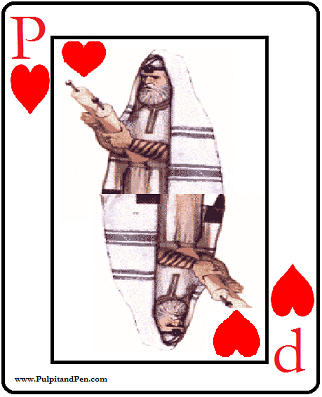You’re here because someone (maybe you) played the Pharisee card. Consider the following, and let’s all remember that if you’re going to play the Pharisee card, you should play it fairly.
OK, so I stole the idea from an article posted at Issues Etc. But the next time someone plays the Pharisee card, consider the following…
The Pharisees weren’t rebuked because they were “legalistic”….
“Woe to you, scribes and Pharisees, hypocrites! For you tithe mint and dill and cumin, and have neglected the weightier matters of the law: justice and mercy and faithfulness. These you ought to have done, without neglecting the others. (Matthew 23:23 ESV)
Here, Jesus does not rebuke them for tithing from their spice rack. He rebukes them for not being legalistic enough. They ought to have been tithing from their mint, dill and cumin – but they were following only part of God’s law and not all of it. And although we are not under the ceremonial law of Moses, we are under God’s moral law as the spirit of his revealed righteousness. Calling someone a ‘pharisee’ because they strive for personal holiness is rebuking them for something for which Jesus never rebuked the Pharisees.
The Pharisees weren’t rebuked because they were concerned with doctrinal purity…
From Issues, Etc…
The only problem is, Jesus never faulted the Pharisees for being doctrinal purists. He faulted them for being false teachers who abandoned the truth of God’s Word in favor of the erroneous word of man (Matthew 16:11–12; 15:1–9; Mark 7:6–13).
Jesus called Christians who demanded doctrinal purity “disciples,” not “Pharisees.” “If you abide in My word, then you are truly disciples of Mine; and you shall know the truth, and the truth shall make you free.” (John 8:31–32) In fact, Christians who demand doctrinal purity are really following the example of Jesus, of Paul and the other Apostles (Matthew 7:15; see also Matthew 24:10–11; Mark 9:42; 2 Corinthians 15:5; 1 Thessalonians 5:21; 1 Timothy 4:16; 6:3–4; Titus 1:7–9; 2:1, 7–8; 1 John 4:1; 2 Peter 3:17).
Caring about doctrine, in other words, does not make someone a Pharisee. Being wrong makes them a Pharisee.
The Pharisees weren’t rebuked because they weren’t zealous enough about evangelism…
Again, as Issues, Etc. references the same…
Woe to you, scribes and Pharisees, hypocrites! For you travel across sea and land to make a single proselyte, and when he becomes a proselyte, you make him twice as much a child of hell as yourselves. (Matthew 23:15 ESV)
The Pharisees were evangelical, but they didn’t have the right evangel. It seems the Pharisee’s concern for doctrinal purity had no negative impact on their zeal. Again, the Pharisees were condemned because their doctrine was wrong – not because they cared too much about doctrine.
The Pharisees were rebuked because they were in doctrinal error and promoted religious self-helpism.
“Woe to you, scribes and Pharisees, hypocrites! For you clean the outside of the cup and the plate, but inside they are full of greed and self-indulgence. You blind Pharisee! First clean the inside of the cup and the plate, that the outside also may be clean. “Woe to you, scribes and Pharisees, hypocrites! For you are like whitewashed tombs, which outwardly appear beautiful, but within are full of dead people’s bones and all uncleanness. So you also outwardly appear righteous to others, but within you are full of hypocrisy and lawlessness. “Woe to you, scribes and Pharisees, hypocrites! For you build the tombs of the prophets and decorate the monuments of the righteous, saying, ‘If we had lived in the days of our fathers, we would not have taken part with them in shedding the blood of the prophets.’ Thus you witness against yourselves that you are sons of those who murdered the prophets. Fill up, then, the measure of your fathers. You serpents, you brood of vipers, how are you to escape being sentenced to hell? (Matthew 23:25-33 ESV)
The Pharisees had a way to righteousness that was not faith, but a justification via good behavior (today we call it behavior modification or life-change). The Pharisees desired to take care of outside issues, lifestyle issues, behavior issues, surface-level renovation and their theology wrongly promoted this shallow religion. In fact, these Pharisees were of the same spiritual make-up as their fathers who martyred the prophets for preaching the Word of God. The Pharisees preferred their own made-up religion while throwing stones at those who insisted upon a Scriptural religion.
So, if you’ve used the Pharisee Card or had the Pharisee Card used on you, remember to play the card rightly. The card should be reserved for those who don’t care enough about doctrine, or those who care about doctrine but have it wrongly. The card should be used upon those who have traded sound Scriptural exegesis for surface level self-improvement.
That, my friends, is a proper use of the Pharisee Card.














